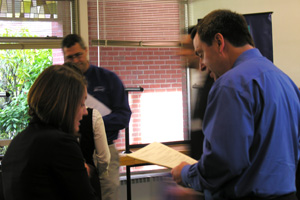Integrated career counseling prepares students to enter troubled economy
Open gallery

Despite news coverage’s emphasis on the country’s economic downturn and school’s increasing budget pressures, school districts are interviewing and building up their applicant pools.
“It can be difficult to offset the main stream media’s messages about the economy and the reality that districts are facing right now,” said Sharon Chinn, executive director of Educational Career and Licensing Services (ECLS). “Schools are facing a world of unknowns because it’s still unclear how stimulus money will trickle down to them or how the tightening of the state budget will affect them. Still, schools are going to be hiring. It may not be the best hiring season, but with some flexibility, qualified applicants are still going to be able to find positions for which to apply.”
Chinn, a veteran of educational career counseling, said that despite the uncertainty facing districts, this year has shown an increase in their interest in Lewis & Clark students. This spring, districts from the Portland-metro area asked to move up their annual job fair for Lewis & Clark students to put it before the Oregon Professional Educator Fair, an event that brings districts together with thousands of applicants from around the state.
Given the level of competition in the field and the hesitancy induced by the changing economy, applicants’ experiences and qualifications are more important than ever.
“Our emphasis from admission through commencement is on the student’s commitment to the field and a strong service orientation,” Chinn said. “From a hiring perspective, what sets our students apart is their focus on being teacher-leaders, who bring together a dedication to social justice and community building, a commitment to service, and often a background with foreign language or study abroad experience.”
Quality, hands-on experience and resume assistance designed to help students stand out
Each of the education programs at the graduate school—Teacher Education, School Counseling, and Education Leadership—approach career preparation with a two-part requirement. In tandem with a yearlong applied learning experience, similar to an internship, students complete a complementary yearlong course that is designed to help them digest their experiences and to prepare them to enter the workforce. This dual approach presents a comprehensive view of the work experience, covering a breadth of necessary lessons from how to find a job to how to problem solve and think creatively once the work has begun.
“Our programs are differentiated by the faculty’s dual commitment to preparing students to become leaders in the field and to helping students develop the skills they need to attain those leadership positions,” Chinn said. “The process helps familiarize the students with the services our office can provide and allows us to stress the importance of job-search skills, like researching job openings, applying, and preparing for interviews.”
In addition to the assistance provided by ECLS, students can also seek help writing resumes and application materials from the Writing Studio.
Unparalleled access to education community provides networking opportunities
An alumna of the graduate school (MA ’91), Chinn has cultivated relationships with school districts and members of the education community for more than 15 years. Through these connections, Chinn is able to take the pulse of what is happening in the Portland area and throughout the state. The information she gains informs her work with students and alumni, ultimately connecting schools with the highly qualified teachers, counselors, and administrators they need.
“Recently, Beaverton School District contacted me to set up a campus visit for district representatives, which ended up being only one of three visits they made this spring,” Chinn said. “Connections like that offer our students an opportunity to network and ensure that when the district is getting ready to hire, Lewis & Clark students are fresh in their minds.”
Chinn’s work to connect with districts also nets results in the hurried part of the hiring calendar: as districts are scrambling to fill spots just before school begins, they call Chinn, looking for information about recent alumni.
Student-organized events bring alumni and current students together
With a focus on improving the quality of graduate student life, the Student Union Network (SUN) plans events and activities to support the entire student community and enhance academic and professional development. For the past few years, SUN has organized gatherings, inviting alumni back to campus to join current students in an evening of informal networking.
“The events provide a relaxed setting where all the guests can enjoy good food and good company,” said Eitan Fire, director of community relations for SUN. “Alumni are proud of Lewis & Clark and want to help current students in any way that they can. Students can gain a helpful perspective about the transition they are making into the professional setting from alumni who have already made the same journey.”
This year’s event, which took place on April 16, was a particularly valuable opportunity for students nervous about the current job market.
“Students may feel less anxious about speaking with an alum about job opportunities than with a recruiter at a job fair,” Fire said. “Though students may not want to think of it as ‘networking,’ it is so important to take advantage of opportunities to gain connections and perspective; and who better to get that from than people in our chosen fields who started out where we are?”
More Newsroom Stories
Public Relations is located in McAfee on the Undergraduate Campus.
MSC: 19
email public@lclark.edu
voice 503-768-7970
Public Relations
Lewis & Clark
615 S. Palatine Hill Road MSC 19
Portland OR 97219

